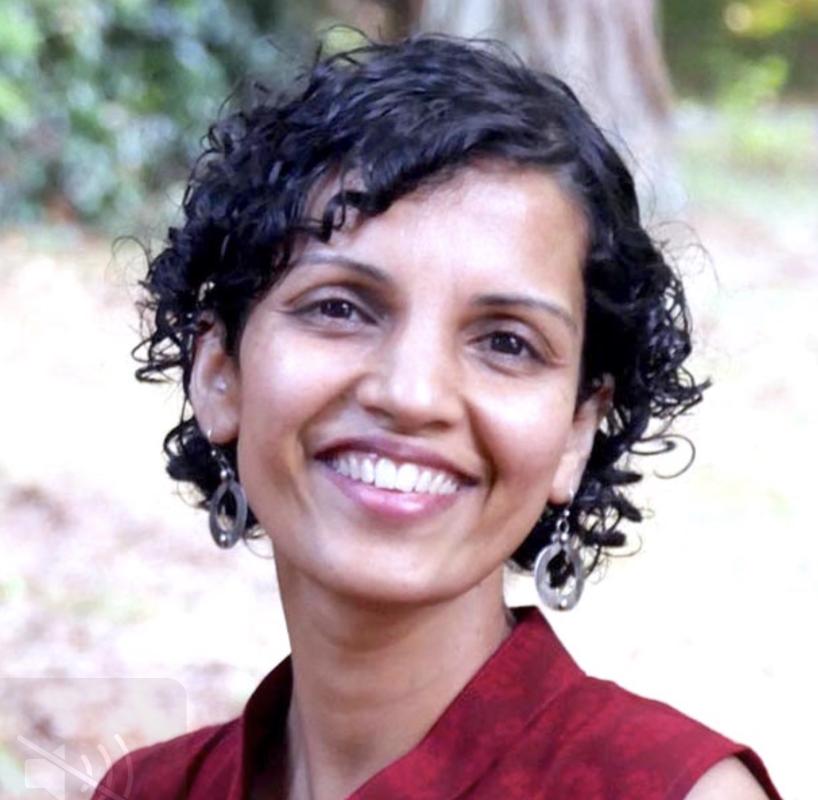We are delighted to have Dr. Harini Rajagopal as the speaker of our next LangSci Talk on Thursday, 22 Feb, 2024. Dr. Rajagopal (she/her) is an Assistant Professor in Language and Literacy Education at the University of British Columbia. Her research interests include languages and literacies in the early years, multiliteracies, culturally sustaining practices, arts-based and decolonizing methodologies, and teacher education.
Prior to her talk, we had a chat with her about her research on antiracist pedagogy, her projects with children, and things that interest her. To learn more about her studies, RSVP below:
Click to RSVP for Harini's Upcoming Talk
1.What does your work/research focus on?
Building on antiracist perspectives, my work focuses on collaborating with young children and teachers to mindfully include diverse communicative repertoires into mainstream classrooms, while paying attention to the intersectional realities of class, cultural, and systemic inequities.
I listen for stories from racialized and marginalized children and families, shared in diverse ways – including with multiple languages, literacies, drawings, photos, art, play, materials – to surface capacities and brilliance, especially in response to the deficit identities they often carry in schools and society. I also listen for young children’s views on their learning, and their perspectives on the world shaped through language, cultural, emotional, and material contexts.
Working collaboratively with teachers, my work focuses on designing multimodal, multilingual, culturally sustaining practices that build on all students’ interests and resources from their homes and communities. My research is in conversation with what happens in homes and classrooms and finding ways to engage with teachers as we responsively, relationally, and creatively value children’s ways of learning and sharing.
2. How does your work intersect with Language Sciences?
Language touches every area of our lives, and the science and the art of this communicative space fascinate me. I feel connected with people in Language Sciences in our shared interest across modalities, cultures, materials, contexts of time and space in how we find fluid ways to engage with lives, to listen to and learn from each other, and to make meaning for ourselves and the world. My interest is in how children create, share, and learn through languages and literacies, and how we can support those practices through creativity, revitalization, and sustainability, all themes that spark conversations and connections in the Language Sciences community.
3. What is a project or initiative that you’ve worked on within the last few years that you’re particularly proud of?
I was grateful to be able to collaborate with Grade 2/3 school children to showcase their multilingual narratives that complemented their photographs and drawings in an art gallery. As part of this design research, the children planned the themes and titled two parts of the gallery “Looking Closely” and “Something/Someone I love” and were delighted to invite their families, their school community, and their friends to this showcasing of their creative energies and courage. For many of the newcomers and those labelled English Language Learners, this gallery offered a space where their whole selves could be celebrated in their community. Visiting grandparents and parents exclaimed when reading narratives in Tagalog, Hindi, Mandarin, German, Spanish, and English and excitedly remarked on children’s close-up drawings of leaves and photos of favourite toys. Teachers and friends high-fived and added cheering notes, and importantly the children glowed with joy. I’m forever inspired by that project and the power of creative spaces to move towards equity in language and literacy education.
4. What inspires you to pursue your line of work?
So many people and so many things! Children across the world are inspiring and bring wonder, curiosity, and the capacity for deep thought and creativity, and support my emergent thinking about being and becoming.
I am profoundly inspired by many researchers, teachers, students, community leaders, Elders, and artists - in my projects in India and here in Canada - teaching and supporting me to interrogate Eurocentric and neocolonial constructions of education, considering ways to decolonize practices, and centring orientations to justice and equity.
I find stories – fiction and non-fiction – powerful in invoking the past, speaking to the present, and journeying to the future. Since stories are ongoing, context-ful, and heartful, and locate intricate experiences in people, time, place, materials, and emotions, human stories feel vital to understanding how to make systemic change.
5. If you had to choose a different career path, what would you be interested in pursuing?
Such a fun question!
Something that permits a deeper understanding of human beings – so communications or counselling, perhaps.
Something that invites building equity creatively and relationally – so something to do with reading lots of books, and creating words and visual art.
And, finally, something that offers honouring the interdependent more-than-human worlds we live in – so ecology, climate justice, or mindfulness, perhaps.
I enjoy being an academic, and as you can tell, I don’t know the one answer to this question. However, I’m finding reflections of these pathways in my life and enjoying speculating about these alternative worlds!
Meet Dr. Harini Rajagopal at her upcoming Talk with LangSci to learn more about the above!
LangSci Luncheon & Talk - Dr. Harini Rajagopal on "Centring the margins: Building equity from relational connections in young multilinguals' fluid language and literacy practices"
February 22, 2024, 12:30 pm to 1:30 pm
Zoom Link: https://ubc.zoom.us/j/66592657114?pwd=eWNPR2x3ZkFxMTJ4V21YMVlOVDBzdz09
Meeting ID: 665 9265 7114
Passcode: 837243
